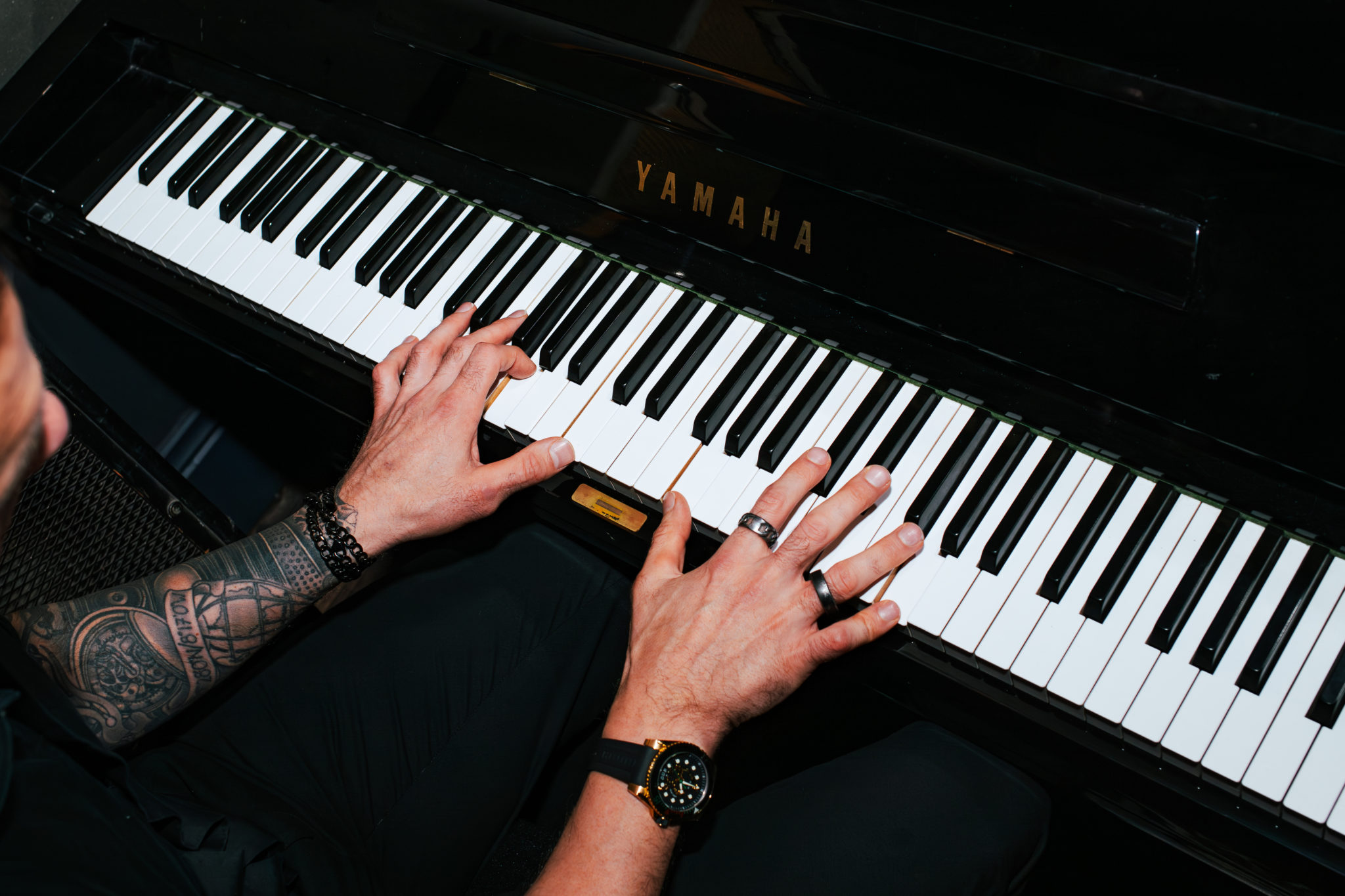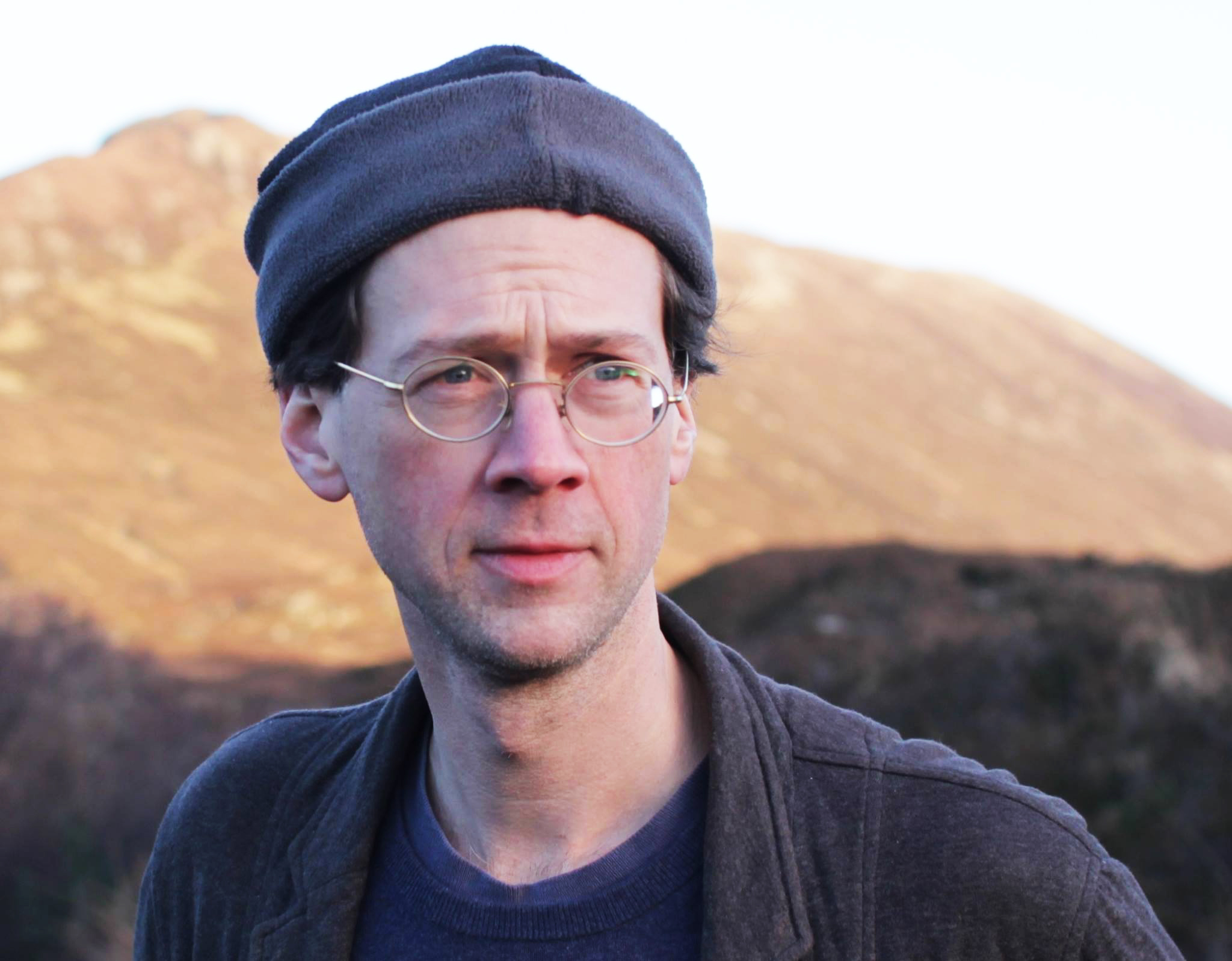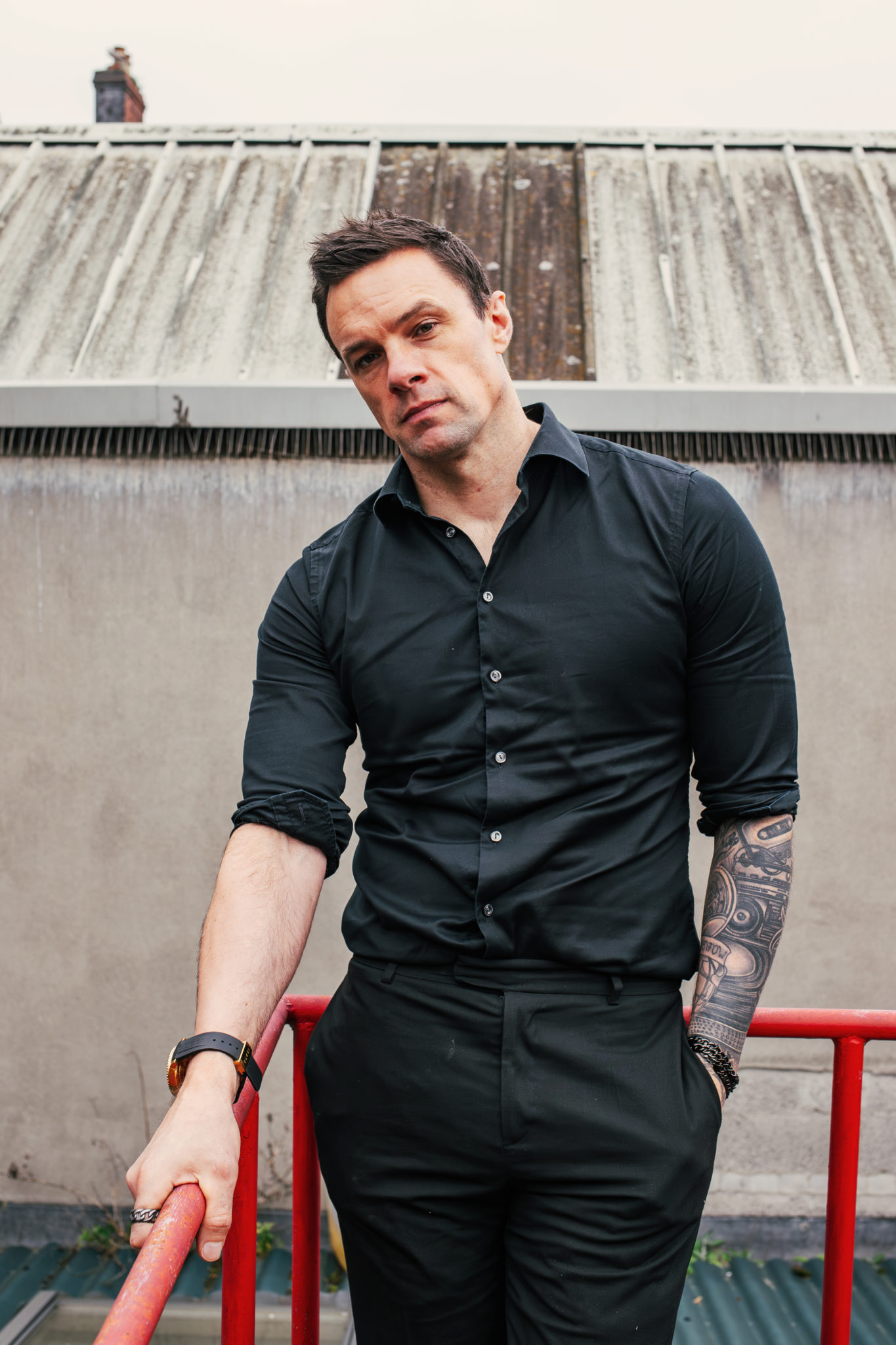- Music
- 05 Nov 25
Niall Breslin: "Spirituality to me is about being connected with those around you and I think we’re losing that"

As he blends music and mindfulness on his new album The Place That Has Never Been Wounded, Niall Breslin chats about metal, Buddhism, the late Manchán Magan and remaining optimistic.
Niall Breslin’s new album, The Place That Has Never Been Wounded, is an enthralling record that boasts a pioneering confluence of music and mindfulness. For many, it will be viewed as a stylistic swerve from both his previous four albums with The Blizzards and his two solo records.
However, sitting in the funky surrounds of Camden Recording Studios, the artist better known as Bressie, tells me, “Well it is, and it isn’t, because my mum’s a piano teacher, and my education in music began on our Bechstein piano.”
An extended version of the album is planned for January 2026, to include spoken word reflections intended for use in guided meditation. A sneak peek of ‘The Novice Soul’ containing some wonderful words – “The Bechstein barely fit / Used as a table as much as a purveyor of melody / My youthful fingers found the keys by accident at first / Stumbling at the sound the way a drunk finds a wall”– marvellously captures the young Niall’s introduction to the piano.
“She didn’t give me lessons,” he continues.“She just told me,‘You have an ear, I want you to naturally learn how to play it.’ And that’s what I did.”
Niall’s music education was broadened in the choristers, a choir run in his hometown of Mullingar, by the skilled Shane Brennan. It was a background in classical music, which became corrosively and splendidly diluted when, “I joined a deaf metal band called RAMSCAR, which stood for Rise Almighty Satan Come And Rule, to piss off the Christian Brothers, and realised I loved guitars.”
I laugh loudly. Although we’re both Mullingar men, we’ve never chatted before, but the 44-year-old is exactly what I imagined: sincere, smart, iconoclastic, a tad plangent and a little angry, sure. But funny with it and unafraid to speak his mind, and it’s immediately obvious that the dude adores music.
 Niall Breslin on October 13th, 2025. Copyright Abigail Ring/ hotpress.com
Niall Breslin on October 13th, 2025. Copyright Abigail Ring/ hotpress.com“My guitar days,” he expands, “came in the realm of Pearl Jam, Red Hot Chilli Peppers, these iconic guitar bands that made every teenager want to pick up a guitar. But my real love of music was in heavier stuff – Anthrax, Suicidal Tendencies, early Metallica. Then bands like Deftones and Sepultura came along. I’m now playing neoclassical, ambient stuff, but I’m listening to metal again, because I’m fucking angry at the world, and I forgot that’s such a great outlet.”
Niall lights up when speaking about classical music’s influence on Metallica, his love of pop music and his show on BBC Radio 3. The music played on the latter obviously had a marked influence on the writing of his current record. On the show, he spins Schumann, Mozart and Beethoven alongside Max Richter, Einaudi, Brian Eno and Hideyuki Hashimoto. However, the current album – written before his involvement in the show – was started mid-pandemic and wrapped up 15 months ago.
“It was a concept,” he explains, “derived from a Meister Eckhart quote – ‘There’s a place within the soul that’s never been wounded’. I just love the idea of that. I think a lot of people are constantly told what they don’t have or what they need more of. It’s a constant wellness, Tony Robbins, fridge magnet philosophy thrown at us all the time.
“And I’m thinking to myself, ‘Fuck, how can we be any more resilient? Look at the shit we’ve dealt with in the last 10 years.’ It’s about recognising that there’s a part of us, which when the world shakes, keeps us steady. I genuinely think it’s in everybody. People experience it in moments of grief. You wonder, ‘How the fuck did I get through that?’ It’s that part that I was trying to write about.”
Meister Eckart was an influential mystic and theologian of the Middle Ages, and latterly an influence on Heidegger and Thomas Merton – we’re treading some enigmatic territory here.
“Eckhart, Rumi – that’s the stuff I would have been reading for my Masters,” Niall replies. “I was wondering how do I bring people over 14 tracks to that place? How do I show there’s that place in them?”
Eckart taught that experiencing the divine is not looking outward, but realising it is perceiving through you.
Niall leans in, talks passionately about the recent passing of his close friend, Manchán Magan.
“I had so many conversations with him about this at his home in Westmeath,” he says. “Every time I met him, it was like a degree in an hour. He was talking about the connection the pagans had with the land.
I’m not a religious person. I think it was beaten out of me. Literally. I have very little time for institutional religion. I don’t have faith, but I’m spiritual. It’s about that side of ourselves. I don’t preach it at people, it’s not my place, but I know that it’s been very therapeutic for me.
“I do think there’s something missing in society. I think our new god and new religion is economics, and that’s who we praise at the altar. Now it’s a fucking neoliberal, blinding drive for growth, that’s where we’re at. My degree is in economics, I know how countries work, but we dropped the ball on basic social issues in this need for prosperity. Spirituality to me is about being connected with those around you and I think we’re losing that.”
Do you think there’s a way back?
“I do,” he states, “of course I do. If you ever read Malcolm Gladwell’s work on tipping points, I think there will be a mass rejection of social media in the next 10 years, a post-digital revolution. We’ve cannibalised it and a lot of people are coming back to that part of themselves. There’s a great book – Viktor Frankl’s Man’s Search For Meaning – that everyone should read to understand times like this, where it feels a little hopeless.
“That’s ultimately what a lot of people in government want. They want apathy. They want us to give up. I think there’s always fucking hope. Think Krishnamurti – ‘It is no measure of health to be well adjusted to a profoundly sick society’. That’s what this album is about – to say that’s how we should feel right now, but it won’t always be like this.
“Maybe I’m being a bit Pollyanna, but I don’t think it will. At Manchán’s funeral, his brother said this line – ‘It’s amazing what one man can do’. I just thought it was a great line about Manchán. It’s a perfect definition of him. Be aware of that – we all have the capacity to do something.”
 Manchán Magan
Manchán MaganWhen I refer to Niall’s debut book Me And My Mate Jeffrey breaking ground in mental health awareness, he immediately defers to Cork hurler and mental health advocate Conor Cusack, and swiftly shifts to talk about his PhD in mental health, in which he is currently enrolled at Trinity College. It’s a move from the micro to the macro, thinking less about Self, more about Society.
The catalyst of his PhD was reading the 2023 CAMHS report. In her final report on the provision of child and adolescent mental health services (CAMHS) in the State, the Inspector of Mental Health Services, Dr Susan Finnerty, said that she could not provide an assurance to all parents in Ireland that their children have access to a safe, effective and evidence-based mental health service. Why is the system not supporting the most vulnerable, especially children?
“It’s deep level inertia”, Niall affirms. “For somebody who’s researched 200 years of mental health intervention, I don’t really know how much further on we are to truly understanding the human mind than we were hundreds of years ago.”
Are we further away?
“I always joke about that if Michelangelo and Da Vinci grew up in 1950s Ireland, we would have put them into an asylum. We have to look at culture and how culture gets to dictate who gets to be normal and who doesn’t get to be normal.”
That’s what actually happened to Artaud. Fintan O’Toole remarked, “There’s something close to the bone about the idea that one of the great geniuses of the first half of the 20th century in artistic terms visited us and we exported him in a straitjacket.”
“The Dangerous Lunatics Act,” Niall explains. “That was the name of the Act that we used to decide whether someone – and you didn’t need any proof that the person you were committing – was insane. I’ve looked at all the committal rates of different places. There was nothing wrong with any of these people. In 1950s Ireland, we had the highest level of people in psychiatric institutions globally.
“So people don’t ask these questions about Ireland. We’ve talked about Magdalene laundries, we’ve looked at other institutions and we’re creating, hopefully, some form of therapeutic support for those who experienced it. But I think we’ve only begun to uncover what happened in the institutions. And I don’t think we want to, because it requires society to put up a mirror to itself.
“The other thing people say is no one really knew what was happening. They’re not subtle these fucking places. There was a warning sign there – if you don’t conform and fit into the normal, this is where you could end up. So, these are the legacies I’m deeply interested in. If you want to understand stigmas, you need to know where they come from. I think if we focus more on creating better communities and environments that’s a better way forward than pathologising everything we experience.”
 Niall Breslin on October 13th, 2025. Copyright Abigail Ring/ hotpress.com
Niall Breslin on October 13th, 2025. Copyright Abigail Ring/ hotpress.comThe understated beauty of midlands topography is also mightily evoked on the record. Yes, it’s a gauche segue, but we need to talk about the album and, after all, we’re both Westmeath men.
“‘Be The Lake’”, Niall grins, “is about Lough Ennell, Lough Owel and Lough Derravaragh. ‘Be The Mountain’ is about Ben Bulben. In mindfulness, they use the lake, the sky and the mountain as a very important visualisation practice. The music should be like a meditation. There are myths around mindfulness and meditation that it’s always this subdued thing.
“Most mindfulness music that I would have listened to is loop based. And I always said the mind is not loop based. The mind is constantly moving and changing. So that’s what I was trying to create with this album. There’s moments where it’s stormy, and there’s moments where it calms down, and that’s the mind. It’s not static and neither is music.”
Song titles well describe the meditations: ‘Non-Judgment’, ‘Untethering’, ‘Grace’, ‘Metta’. Is the latter a Buddhist tenet?
“I studied Buddhism,” Niall expands. “In my own recovery, that was the thing that made most sense to me. I’m not a Buddhist, but I very much aligned to its ideology. The first four tracks on the album are the Noble Truths of Buddhism – suffering is an inevitable part of life and most of our suffering comes from attachment and aversion. When you let go of the need to control that, that’s the third noble truth, and the fourth is Nirvana.”
I suggest Niall is something of a Bodhisattva – a belief in Mahayana Buddhism, referring to an enlightened one who doesn’t go to Nirvana. Rather, they stick around this realm to assist others.
“I don’t tell people to meditate,” he says. “Many people think meditation is going inwards and ignoring the world. That’s not what it is. It’s about connecting with the world. It’s about collective consciousness.
Thích Nht Hnh’s work was designed at the frontline of the Vietnam War. I think what we’ve created is this idea of spiritual bypassing, where people think, ‘I meditate so everyone else can fuck themselves.’ That’s not meditation. Meditation is recognising that we’re built in a community. Everybody’s connected. It’s not just about going inwards and burning incense.”
Perhaps we’re asking the wrong question. Maybe it is not ‘Are you happy?, but ‘Are you valid?
“That’s what the Buddha calls the unquenchable thirst,” Niall replies. “Happiness is an unquenchable thirst, because everything is impermanent, everything is fleeting. As the Buddha says, ‘Don’t hold on to happiness too tightly. It never lasts.’ I used to think achievement is what would make me happy. It doesn’t. I think the only thing that probably brings relative happiness, and when I say relative, it’s not sustainable, is connection. That’s the thing – relationships.”
Another composition on the album, ‘The Credence Frequency’, deals with turning back to the primal transmission between body and mind, the signal that the chaos of modern culture drowns out.
“One of the biggest ways to make somebody feel anxious is to make them feel they’re being surveyed,” he explains. “Someone is always watching. Orwell wouldn’t be able to write this. This isn’t Big Brother. This is us. Michel Foucault said, ‘Power isn’t a top-down thing. It’s the power we have over each other. And that’s power. I can watch you fuck up, and I hold it over you.’”
You mentioned Orwell. Perhaps Orwell never played out, rather Huxley did – they won’t ban the books, we will simply stop reading them. Power is in education, and with your PhD, you are going to the zenith of education. That’s the way you beat them.
“It’s not even beating anybody,” Niall says. “You just reminded me of that Manic Street Preachers lyric, ‘Libraries gave us power / Then work came and made us free’. I think knowledge is power. Back to Foucault – who controls the knowledge? Knowledge is useless if the person feeding it to you has an agenda. To me, knowledge is being able to critically think and make your own mind up.”
I sense that you remain an optimist.
“I am an optimist,” he agrees. “I believe we can be world leaders at this. We’re a population of five million, we’re wealthy, we’re very sound people. Regardless of your politics, we’re relatively stable politically.
We are a perfect case study to show how to build this. Because no one in the world is doing this right. And Ireland can be decent at change.
“We came up with the smoking ban. We went from being one of the most conservative to one of the potentially most progressive countries in Europe in a very short space of time. But we need to want to do it. I think we can actually create a case study for the world and then apply it. And why not?”
• The Place That Has Never Been Wounded is out now. Niall Breslin is currently on nationwide tour, with details at niallbreslin.com
RELATED

- Music
- 26 Jan 26
Niall Breslin and the Polaris Quartet announce Irish tour

- Lifestyle & Sports
- 17 Nov 25
Reactions pour in after Ireland's victory over Hungary: "Stick that up your bollox Viktor Orbán"
RELATED

- Music
- 24 Oct 25






